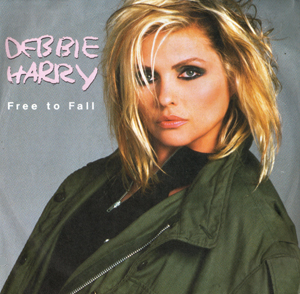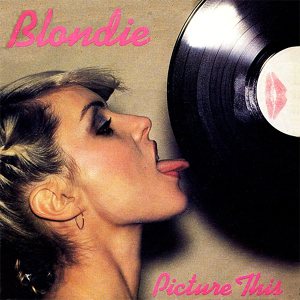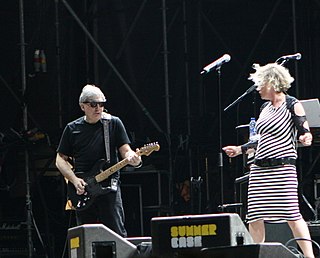
Blondie is an American rock band formed in New York City in 1974 by singer Debbie Harry and guitarist Chris Stein. The band was a pioneer in the American new wave genre and scene of the mid-1970s.

"Call Me" is a song by the American new wave band Blondie and the theme to the 1980 film American Gigolo. Produced and composed by Italian musician Giorgio Moroder, with lyrics by Blondie singer Debbie Harry, the song appeared in the film and was released in the United States in early 1980 as a single. "Call Me" was No. 1 for six consecutive weeks on the Billboard Hot 100, where it became the band's biggest single and second No. 1. It also hit No. 1 in the UK and Canada, where it became their fourth and second chart-topper, respectively. In the year-end chart of 1980, it was Billboard's No. 1 single and RPM magazine's No. 3 in Canada.

"Rip Her to Shreds" is a song by American new wave band Blondie, which features on the band's self-titled debut album.

"In the Flesh" is a song by American band Blondie and their first to chart. Originally from the band's self-titled debut album, Blondie, the song was Blondie's second and final single on the Private Stock label.

Autoamerican is the fifth studio album by American rock band Blondie. It was released in November 1980 and reached No. 3 in the UK charts, No. 7 in the US, and No. 8 in Australia. The album spawned two singles, "The Tide Is High" and "Rapture". "The Tide Is High" hit number one in several countries, including the US and the UK. "Rapture" became the first rap song ever to reach number one on the singles chart in the US. It also reached number five in the UK and number four in Australia.

"Rapture" is a song by American rock band Blondie from their fifth studio album Autoamerican (1980). Written by band members Debbie Harry and Chris Stein, and produced by Mike Chapman, the song was released as the second and final single from Autoamerican on January 12, 1981, by Chrysalis Records. Musically, "Rapture" is a combination of new wave, disco and hip hop with a rap section forming an extended coda.

"In Love with Love" is a 1987 song recorded by the American singer Debbie Harry. It was taken from her second solo album Rockbird and released as the third single in 1987.

"Free to Fall" is a song by American singer Debbie Harry from her second solo studio album, Rockbird (1986). It was released as the second single in the United States and the United Kingdom. Suffering from lack of record company promotion, the single failed to chart on the Billboard Hot 100 or any other significant U.S. chart, and peaked at number 46 on the UK Singles Chart. The B-side to the single, "Feel the Spin", was a previous U.S. dance hit from the soundtrack to the film Krush Groove.

"Backfired" is the debut solo single from American singer and Blondie vocalist Debbie Harry. Released in 1981, it was taken from her debut solo studio album, KooKoo.

"Dreaming" is a song by American new wave band Blondie. Released in 1979, the song was the opening track from their fourth album Eat to the Beat. Written by guitarist Chris Stein and singer Debbie Harry and partially inspired by ABBA's "Dancing Queen," the song also features an active drum performance by drummer Clem Burke, who did not expect the final recording to feature his busy drum track.

Debravation is the fourth solo album by American singer Deborah Harry, released in July 19, 1993. It was the final album Harry made whilst signed to the Chrysalis label, thus ending a successful partnership that began with her time as a member of Blondie and had endured for over 15 years. The album reached No. 24 in the UK Albums Chart.

The Complete Picture: The Very Best of Deborah Harry and Blondie is a greatest hits album released on March 4, 1991, by Chrysalis Records. It contained all of Blondie's highest-charting singles such as "Heart of Glass", "Sunday Girl", "The Tide Is High", "Atomic", and "Call Me", as well as some of Deborah Harry's solo singles, including the UK top-10 single "French Kissin' in the USA".

"Picture This" is a 1978 song by the American rock band Blondie, released on their third album, Parallel Lines. Written by Chris Stein, Debbie Harry and Jimmy Destri, the song features evocative lyrics that producer Mike Chapman surmised were written by Harry about Stein.

"Maybe for Sure" is a 1989 song by the American singer Debbie Harry, released as a single from her third solo album Def, Dumb & Blonde.

"I Can See Clearly" is a song by American singer Debbie Harry, released in June 1993 as the first single from her fourth solo album, Debravation (1993).

Most of All: The Best of Deborah Harry is a compilation album of recordings by Deborah Harry, released by Chrysalis Records in 1999.

Since 1976 the American new wave band Blondie has released 11 studio albums, 4 live albums, 14 compilation albums, 3 remix albums, 3 EPs, and 38 singles. The band has sold an estimated 40 million albums.

Deborah Ann Harry is an American singer, songwriter and actress, best known as the lead vocalist of the band Blondie. Four of her songs with the band reached No. 1 on the US charts between 1979 and 1981.
The Wind in the Willows was an American psych folk band, best known for being the first band of Blondie co-founder, Debbie Harry. The group took its name from British writer Kenneth Grahame's The Wind in the Willows, a classic of children's literature.

American singer Deborah Harry has released five studio albums, five compilation albums and 24 singles. Until 1988, Harry used her nickname "Debbie" on all releases but she is now known professionally as Deborah Harry.



















